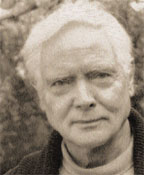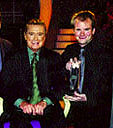|
November 8, 2000 Class Notes Class Notes Features: Poet William Merwin '48 tackles Purgatory World
government? John
Griffin '99 makes Millionaire Email your class notes...many secretaries have email. Check our online Class Secretaries Directory. Poet William Merwin '48 tackles Purgatory
Merwin finally did publish a selection of Spanish ballads in 1961 and followed up with translations of works by writers as diverse as Euripides and Pablo Neruda. But Merwin's reputation rests on his own poetry, for which he won the 1971 Pulitzer Prize. In 1998, he wrote a narrative poem on Hawaii and has taken on ecological causes. Dante has been one of Merwin's favorite poets since he was a teenager. Through his travels - he has lived in places ranging from the Majorca Islands to Maui, his residence for the last quarter-century - he kept the Divine Comedy close at hand, but he didn't attempt to translate any of the 14th-century Florentine's works until 1991, when he turned to cantos 26 and 27 of the Inferno. Hooked, Merwin began on the Purgatorio, in which Dante and his guide, the Roman poet Virgil, tour the mountain where souls destined for Heaven are first punished as penance for their sins. Unlike Inferno and Paradiso, Purgatorio takes place on Earth, which is part of its attraction for Merwin. "It's the most beautiful and interesting part of the poem," he says. "It is immediate experience, and it's impelled by such mixed feelings." All Merwin's work on
the poem hasn't diminished the magic of Dante. "I've sometimes
thought that if you translate something, you never hear it again
in the original," he says. "That hasn't been true for
Dante and me." By David Marcus '92
David Marcus is a reporter for the Daily Deal in New York City.
World
government?
Flash forward 20 years, to the January 17, 2000, issue of The New Republic, whose cover hawked, "America is surrendering its sovereignty to a world government. Hooray. By Robert Wright." Wright, who lives in Washington, D.C., has become convinced that the birth of the euro (the common European currency) and the World Trade Organization are just the first of many inevitable steps in the direction of world government. Wright's thinking hit the shelves in January with the publication of Nonzero: The Logic of Human Destiny (Pantheon), a weighty tome that took three and a half years to produce. In it, Wright argues that life - both at the level of biology and society - tends to evolve with increasing complexity. Wright concludes, among other things, that today's world is simply bound up by too many interconnections to survive with old-fashioned government. "Either we get more and better supernational governance," Wright explains in an interview, "or we'll have more chaos." Nonzero blends Wright's interest in politics with his passion for science. A Woodrow Wilson School major, he took a special interest in science classes taught by such professors as John Bonner, Henry Horn, and James Beniger. Wright acquired a special fascination for sociobiology, the then-new field that argued that cultural traits can be explained through evolutionary principles. "I got pretty wrapped up right away in the sociobiology worldview," Wright says. One of his first published science articles, about Bonner's 1980 book, The Evolution of Culture in Animals, ran in PAW. He later profiled pioneering Harvard sociobiologist E. O. Wilson, an article that later became the basis of Wright's 1988 book, Three Scientists and their Gods: Looking for Meaning in an Age of Information. Initially an academic hot potato, sociobiology later embedded itself into mainstream science. But it still raises hackles in some corners - especially, it seems, whenever Wright is manning the barricades. Wright's 1994 book, The Moral Animal: Evolutionary Psychology and Everyday Life, stirred the pot with pronouncements about the differences between men and women - pronouncements that some critics, including many women, contended verge on stereotypes. Wright counters, "There are people who either don't think what I write is true, or who don't like the implications, or both. I wouldn't do a lot of recanting, though if I could do it over again, I would at times try to be clearer." Perhaps most notable
for their sheer venom are Wright's sporadic public feuds with Harvard
paleontologist Stephen Jay Gould that emerged over their different
interpretations of evolutionary theory. The battle reengaged in
The New Yorker earlier this year when Wright published an eight-page
pie-in-the-face to Gould. Asked whether he had ever met Gould, Wright
shakes his head. "I don't think either of us is working too
hard on finding each other's phone number." By Louis Jacobson '92
Louis Jacobson covers politics for National Journal and writes frequently on science.
John
Griffin '99 makes Millionaire
Griffin was commissioned to give Who Wants to Be a Millionaire, which originated in England, an American feel, he says. For his efforts, he won the 1999 BMI award for music on the most successful game show. The entertainment industry isn't new to Griffin, the associate producer for CBS's The Early Show with Bryant Gumbel. Even before coming to Princeton, he spent an eight-month stint acting in Arcadia, a play by Tom Stoppard, at New York City's Lincoln Center and later landed a part in director Woody Allen's 1995 movie Everybody Says I Love You. Griffin believes it was the strength of his acting that brought him to Princeton. But once on campus, he found that he no longer enjoyed performing as much as composing music. While earning a certificate in theater and dance and majoring in English, Griffin, a self-taught pianist, worked on the music and sound design for campus productions such as Richard III and Hamlet Machine. Millionaire is just another step in Griffin's continuing professional music career. He has reperformed the original British music for the show, using a different beat and new instrumentation; the new version is available on the Millionaire album. He has written music for The Early Show, and there are plenty more irons in the fire. Despite his upbeat personality,
Griffin says he specializes in somber music - "I think it tells
you more." By Gabe Pell '03
Gabe Pell is a writer for The Daily Princetonian, where a version of this story originally appeared.
|
||||||

 William
S. Merwin '48 applied a lifelong habit to a lifelong passion in
his recent translation of Dante Alighieri's Purgatorio (Knopf, 2000).
As a young man, Merwin befriended the poet Ezra Pound, who suggested
he read and translate European medieval poetry. Merwin first tackled
some Spanish ballads, only to be tackled by them. "I worked
for a couple of years getting nowhere," says Merwin, a poet
and translator by trade who majored in English at Princeton.
William
S. Merwin '48 applied a lifelong habit to a lifelong passion in
his recent translation of Dante Alighieri's Purgatorio (Knopf, 2000).
As a young man, Merwin befriended the poet Ezra Pound, who suggested
he read and translate European medieval poetry. Merwin first tackled
some Spanish ballads, only to be tackled by them. "I worked
for a couple of years getting nowhere," says Merwin, a poet
and translator by trade who majored in English at Princeton. As
an upperclassman and part-time stringer for the Red Bank [N.J.]
Register, Robert A. Wright '79 covered a campus speech by an advocate
of one-world government. Wright remembers being distinctly unimpressed.
"I remember just ridiculing the guy. It seemed like the craziest
idea. World government?"
As
an upperclassman and part-time stringer for the Red Bank [N.J.]
Register, Robert A. Wright '79 covered a campus speech by an advocate
of one-world government. Wright remembers being distinctly unimpressed.
"I remember just ridiculing the guy. It seemed like the craziest
idea. World government?" Some
people struggle their entire lives to break into show business.
John J. Griffin '99 managed to make a name for himself less than
a year after graduating. Though you probably wouldn't recognize
his face, you might have heard his music. Griffin wrote "U.S.
Millionaire," the three-chord musical progression that is played
at the beginning of the Who Wants To Be a Millionaire series, one
of today's most popular television game shows, on ABC. He also composed
the music that President Clinton entered to at the Democratic convention
and the music that accompanied Fox News's coverage of John F. Kennedy,
Jr.'s plane crash disaster.
Some
people struggle their entire lives to break into show business.
John J. Griffin '99 managed to make a name for himself less than
a year after graduating. Though you probably wouldn't recognize
his face, you might have heard his music. Griffin wrote "U.S.
Millionaire," the three-chord musical progression that is played
at the beginning of the Who Wants To Be a Millionaire series, one
of today's most popular television game shows, on ABC. He also composed
the music that President Clinton entered to at the Democratic convention
and the music that accompanied Fox News's coverage of John F. Kennedy,
Jr.'s plane crash disaster.